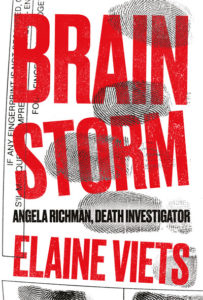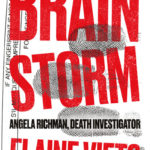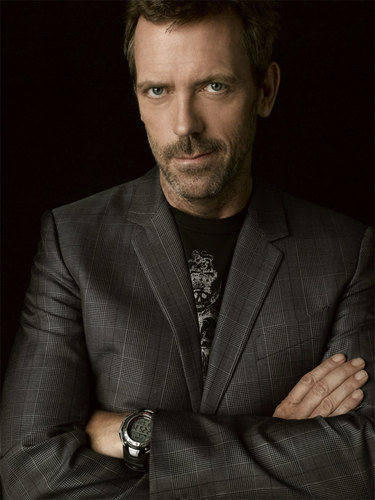By Elaine Viets
Dr. Gregory House is a creature of fiction. Real doctors aren’t that insensitive, are they?
Oh, yes they are. I had a brain surgeon who made Greg House look like Marcus Welby.
Dr. Jeb Travis Tritt is the brain surgeon who saved my life after I had six strokes, including a hemorrhagic stroke, in April 2007. That’s not his real name, and he doesn’t look or act like the brain surgeon in my new mystery Brain Storm. But Dr. Tritt, as I baptized him, was a real character. I couldn’t make up what he said – I’m not that creative.
 In fiction and reality, Dr. Tritt is a brilliant surgeon with a lousy bedside manner. He saws open skulls for a living, so I expected him to be a little strange. But hey, so am I.
In fiction and reality, Dr. Tritt is a brilliant surgeon with a lousy bedside manner. He saws open skulls for a living, so I expected him to be a little strange. But hey, so am I.
 Brain Storm, the first Angela Richman, Death Investigator novel, is set in mythical, ultrawealthy Chouteau Forest, Missouri. Angela and I had blinding headaches and other classic stroke symptoms that sent us to the ER. There we were misdiagnosed by the neurologist on call, who said we were “too young and fit to have a stroke.” This comment is staggeringly stupid, though I didn’t know it at the time. Babies can have strokes. Dr. I. M. Incompetent told Angela and me to come back in four days for a PET scan.
Brain Storm, the first Angela Richman, Death Investigator novel, is set in mythical, ultrawealthy Chouteau Forest, Missouri. Angela and I had blinding headaches and other classic stroke symptoms that sent us to the ER. There we were misdiagnosed by the neurologist on call, who said we were “too young and fit to have a stroke.” This comment is staggeringly stupid, though I didn’t know it at the time. Babies can have strokes. Dr. I. M. Incompetent told Angela and me to come back in four days for a PET scan.
 We never got that scan. Instead, we had a series of strokes, brain surgery, and a coma, and encountered Dr. Jeb Travis Tritt. After brain surgery, Angela and I were in a coma for a week and spent three months in the hospital.
We never got that scan. Instead, we had a series of strokes, brain surgery, and a coma, and encountered Dr. Jeb Travis Tritt. After brain surgery, Angela and I were in a coma for a week and spent three months in the hospital.
That’s where Angela and I parted company. When she came out of the coma, she learned that the doctor who nearly killed her had been murdered. The chief suspect was Dr. Tritt. Angela, still drugged and hallucinating, was determined to save the doctor who saved her. I can’t kill the doctor who misdiagnosed me. Except in fiction.
 But I did experience Dr. Tritt’s midnight monologues, and put them in Brain Storm.
But I did experience Dr. Tritt’s midnight monologues, and put them in Brain Storm.
When Dr. Tritt got off work at midnight, he’d stop by my room. First he’d check my healing wound – a hideous cobblestone of a bump. Then he’d settle in for a monologue, talking nonstop for two or three hours. I was a captive audience – I couldn’t walk yet. He’d make jaw-dropping comments. I was heavily drugged and still talking to imaginary friends. But I knew I had a real find. Dr. Tritt’s visits were a gift. It took me nine years to use it.
One night Dr. Tritt said, “Do you remember anyone talking to you while you were in a coma?”
“No,” I said. “No tunnel of light, no relatives waiting on the other side. I didn’t see or hear anything.”
“Thank God,” he said. “I used to stop by every night and say, ‘Elaine! This is God! Wake up!’ But the nurses made me quit.”
 Why did a surgeon spend hours talking to me instead of going home? He answered that question in another monologue.
Why did a surgeon spend hours talking to me instead of going home? He answered that question in another monologue.
“My wife is divorcing me,” he said. “She likes to shop and I don’t make enough money. She thought brain surgeons would be rich, but I don’t get that much. I only got three thousand dollars for your surgery. She wasn’t that good in bed, anyway. She just laid there, like you did, except you were in a coma.”
Huh? It didn’t occur to the doctor that perhaps his performance might have something to do with his wife’s lack of enthusiasm. The doc wasn’t coming onto me. My face was swollen, my skin was bright red thanks to an allergy to some medication, and half my hair was shaved off.
I’d always been proud of my long hair. I was shocked when I saw it had been partly shaved off for the surgery. Late one night, Dr. Tritt said, “I’m sorry about your hair.”
“In the grand scheme of things, it’s not the end of the world,” I said.
“I burned your hair because I knew you were going to make it,” he said. “If my patients are going to die, I save their hair because they like to look good in their coffins.”
 I was speechless. But then I thought: What would he say if I was going to die? Would he come by one midnight, hand me my hair and said, “Elaine, you’re screwed. But here’s your hair. You’ll look great in your coffin.”
I was speechless. But then I thought: What would he say if I was going to die? Would he come by one midnight, hand me my hair and said, “Elaine, you’re screwed. But here’s your hair. You’ll look great in your coffin.”
Good old Jeb Travis Tritt. This real life character saved my life. Now I hope he can help me pay off those hospital bills.
++++++++++++++++++++++++++++++++++++++++++++++++++++++++++
 Brain Storm is on sale as a trade paperback, audio and e-book amzn.to/2awPsIe
Brain Storm is on sale as a trade paperback, audio and e-book amzn.to/2awPsIe
Win an autographed hardcover of Elaine’s seventh Dead-End Job mystery, Clubbed to Death. http://elaineviets.com/index.php?id=contests



Wow, Elaine! As someone who has has had a lifelong brain fluid imbalance, hydrocephalus, (which was not diagnosed until I was in my 50’s), your story resonates. There’s nothing like having to put your brain in someone’s hands for major surgery. I’m also profoundly grateful you pulled through. Back when I first learned about your stroke (you may have still been in the hospital at the time), I remember becoming aware that mystery writers had rallied to promote your latest book, since you were unable to at the moment. The details of that time have become a bit hazy, but I do remember sitting outside a bookstore at a table in Washington DC with another writer, promoting your book (along with ours, but trust me, your books sold WAY better). I think Bouchercon was going on in Washington at the time? So everyone was talking and exchanging emails about the progress of your recovery. That experience revealed to me how caring and supportive the writing community truly is. Going forward, I visualize a new TV series based around your wonderful neurosurgeon, Dr. Tritt, and his nocturnal monologues. Paging Hollywood! ?
You’re remembering the tour by proxy, Kathryn. Mystery writers from across the nation banded together to save my career and sell my books. I am profoundly gratefu to the generous people who saved my career. I was stil in the hospital at the time. Now I have an opportunity to thank you in person. I wouldn’t be writing today without you.
Everyone was happy to do whatever they could. I recall breathing a sigh of relief when someone relayed an email from someone who had visited you; it conveyed a message along the lines of “Elaine is still Elaine,” still cracking jokes and ready to write her next book!
I think because we kill people for a living, mystery writers are kinder than other groups I’ve dealt with. But I’m prejudiced.
One of the most important things in fiction to me is raising awareness and being an agent for change or at least self-examination while giving the reader a good story.
Sounds like what you’ve got here. I look forward to reading it.
Strokes are an important issue, BK. They kill more women than breast cancer, but most men and women don’t know the signs of strokes. I’m hoping to make people aware of these life-saving facts.
I went in for a brain scan once, but they didn’t find anything.
Hah! ?
I’m sure they would have found you have a big heart, Jim.
I remember sitting in Seasons 52 with you not long after you were up and on the mend. You said you wanted to write about your stroke but you weren’t sure how. You mentioned maybe doing a non-fiction book but as I recall, I think we both agreed it would make a good novel. I remember you were worried at the time that, given your past books, you — and your readers — wouldn’t survive a trip to “the dark side.” But you did. Brilliantly. Maybe this is the writer’s true gift, that they take whatever life dishes out at them, good and awful, and spin it into gold.
You were another rock in a bad time, Montee, and I remember that conversation. It only took nine years to write BRAIN STORM.
I loved Brian Storm! And I remember the ‘tour by proxy’ and the writers from around the country who pulled together to help you out.
As I was reading about “You are too young to have a stroke” I was thinking about my father. He had shoulder pains. My mom made him call his doctor. His doctor told him it was probably just sore muscles and to come in Tuesday afternoon. He died of a heart attack two hours before the appointment.
Aw, Alan, I am so sorry for your loss. Your father was our lawyer, a good and learned man.
The tour by proxy is proof that the mystery community is one of the most generous groups in the world. They saved my book at their expense.
Elaine,
Dr. Travis Tritt not only saved your life, he gave you the classic character of all time. Multiple gifts out of the same catastrophe.
And you gave him a gift by listening when he needed a kind ear.
In the grand scheme, nine years is a blink. The treasure of your book lasts forever.
As PJ Parrish said, writers have the gift to use everything in their lives as fodder. Another reason why I am very lucky.
Reading Brain Storm I often wondered how much was autobiographical (regarding the stroke, hospital, and recovery; I knew the murder was fiction). There’d be nothing like sitting in a car and having your head spew out pus. I totally understood the weird mental stuff. When I had hip surgery earlier this year my mind played tricks on me, and I wasn’t at full mental capacity for a bit, and the hip isn’t anyplace close to the brain. (Hmmm. Maybe for some people it is.)
I also understand the misdiagnosis part. When I first had hip problems I went to a well-respected hip specialist who I believe did not diagnose me correctly, especially when I went back repeatedly with the same problem. (For more details on this, if you’ve got nothing but time on your hands or are planning on hip surgery, you can see my blog on this hipresurfacingwoman.com, the story of how I wound up in my condition being one of the entries at the bottom.) Of course, a hip isn’t a brain. I feel for you with that.
And, yeah, staggeringly stupid about the “too young” for the stroke. A kid in my high school had had both heart attacks and strokes as a child. They happen. As for not recognizing the symptoms… When my dad was having a stroke I had to argue with a 911 operator about exactly why I knew my dad was having a stroke (she had her doubts; I was right). Also, the symptoms can be subtle. Everybody should become familiar with the FAST symptoms. Google this. Another time I became aware that my mother’s speech pattern wasn’t quite right. She insisted nothing was wrong. Her face was not drooping. Her arm was not hanging. But the speech wasn’t right, and she couldn’t repeat three items I told her (mental status check) after a few moments. Most people wouldn’t have noticed, but I did. Off to the ER, and yes, she was having a minor stroke. Had you been my friend at the time and you described your symptoms, and told me what the doctor told you, I would have insisted on a visit to another hospital. I’m glad you recovered.
You saved your mother’s life — I’m impressed. Yes if Don and I had known the FAST signs, we would have gone to another hospital. The doctor who misdiagnosed me was so “respected.”
What are those stats? Medical malpractice is the #3 cause of death? We’ve seen other examples just on this blog.
Elaine, if I could “like” this post a hundred times I would. You’re so eloquent about all this, now, and write about it with such grace. How surreal those nights must have seemed.
“I burned your hair because I knew you were going to make it,” he said. “If my patients are going to die, I save their hair because they like to look good in their coffins.” –The uninventable dialogue. I’m so, so sorry that you had to go through all that to hear it.
It was surreal, Laura. Midnight, in a stroke ward is spooky enough. But perfect for a mysery writer.
You are a trouper indeed! I met Susan McBride because she stood in for you in St. Louis. She also allowed me to read an excerpt from your book, which I had with me.
This wonderful book and the friendships prove that good can come from bad.
A storytelling friend had a stroke en route to a festival. The storyteller who was driving her knew something was wrong when she stopped talking — storyteller don’t stop. Quick action, finding the closest hospital and starting treatment quickly, made a big difference. Hugs <3
Bravo to your storyteller friend, Mary, for recognizing that something was wrong and going straight to the hospital with her ailing friend.
Susan McBride is another one of the many fine writers who helped me. I am indebted to the entire community.
Wow, Elaine. How frightening. I hope you’re doing well now.
As far as the doctor, what an odd thing to say. But I bet it makes the story all the more believable.
I’m fine, Sue. The doc’s bizarre statements added much needed comic relief to my book — and my life.
Dr. Tritt does sound like a character, both on the page and in real-life.
Pingback: Writing Links in the 3s and 5…9/13/16 – Where Genres Collide